
Find Help
More Items From Ergsy search
-

What is colorectal cancer?
Relevance: 100%
-
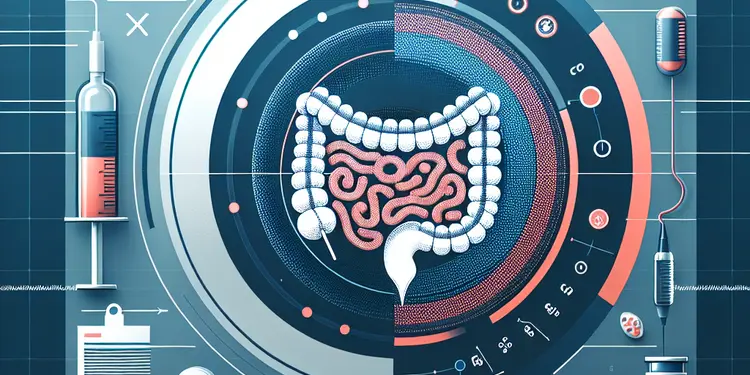
Is genetic testing available for colorectal cancer?
Relevance: 92%
-

Can aspirin stop colorectal cancer?
Relevance: 92%
-

What factors increase my risk of colorectal cancer?
Relevance: 91%
-

What are the recommendations for colorectal cancer screening?
Relevance: 90%
-

Is aspirin recommended for everyone to prevent colorectal cancer?
Relevance: 89%
-

Are there risks associated with home colorectal cancer tests?
Relevance: 88%
-

How can I test myself for colorectal cancer?
Relevance: 88%
-

Will insurance cover the cost of home colorectal cancer tests?
Relevance: 87%
-

Has aspirin been proven to cure colorectal cancer?
Relevance: 87%
-

Can home colorectal cancer tests replace a colonoscopy?
Relevance: 86%
-

What are the advantages of an at-home colorectal cancer test?
Relevance: 86%
-
Can lifestyle changes also help prevent colorectal cancer?
Relevance: 85%
-
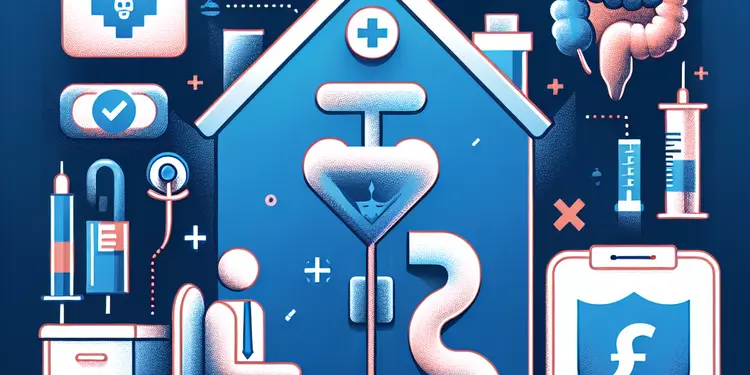
How often should I perform a home colorectal cancer test?
Relevance: 84%
-

Should people with a family history of colorectal cancer take aspirin?
Relevance: 84%
-
Is aspirin more effective for certain age groups in preventing colorectal cancer?
Relevance: 80%
-

Can aspirin prevent colorectal cancer?
Relevance: 66%
-

Are home tests for colorectal cancer accurate?
Relevance: 66%
-
Are there ongoing studies about aspirin and colorectal cancer?
Relevance: 63%
-

What alternative methods exist to screen for colorectal cancer?
Relevance: 59%
-

Can lifestyle factors influence the results of a colorectal cancer test?
Relevance: 59%
-
Is aspirin effective in preventing other types of cancer?
Relevance: 58%
-

What are the main methods for testing yourself for colorectal cancer?
Relevance: 58%
-

At what age should I start testing myself for colorectal cancer?
Relevance: 56%
-
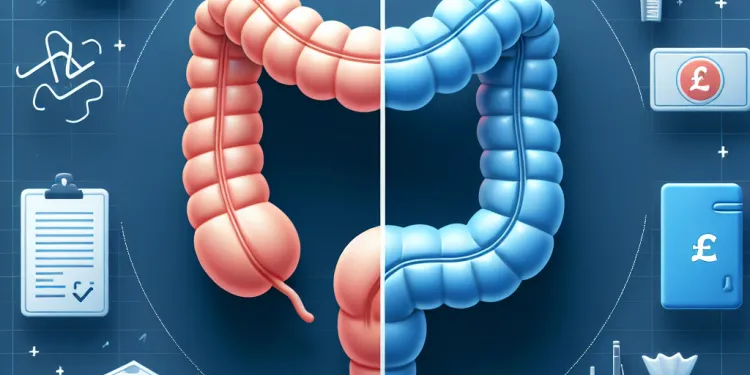
What is the difference between colon cancer and rectal cancer?
Relevance: 54%
-

How long does it take to get results from a home colorectal cancer test?
Relevance: 53%
-

How does aspirin work to reduce cancer risk?
Relevance: 51%
-
How long do studies suggest taking aspirin for cancer prevention?
Relevance: 49%
-
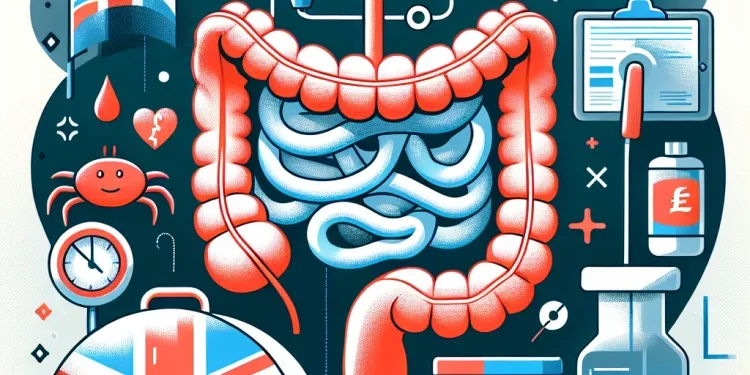
What is Bowel Cancer?
Relevance: 49%
-

What dosage of aspirin is considered effective for cancer prevention?
Relevance: 47%
-
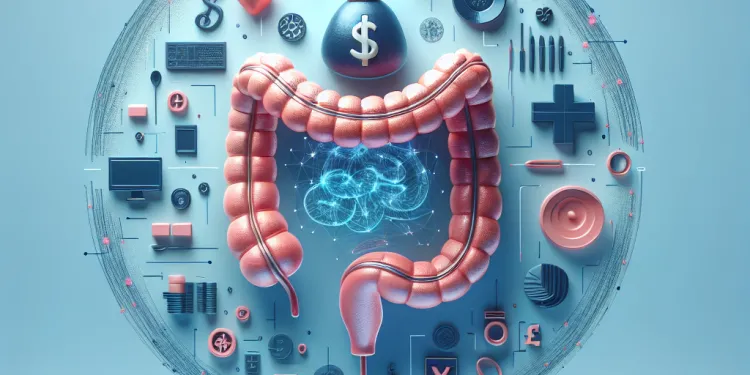
How common is bowel cancer?
Relevance: 47%
-

What should I do if I'm considering aspirin for cancer prevention?
Relevance: 47%
-
Has the FDA approved aspirin for cancer prevention?
Relevance: 47%
-

What are the risk factors for bowel cancer?
Relevance: 46%
-
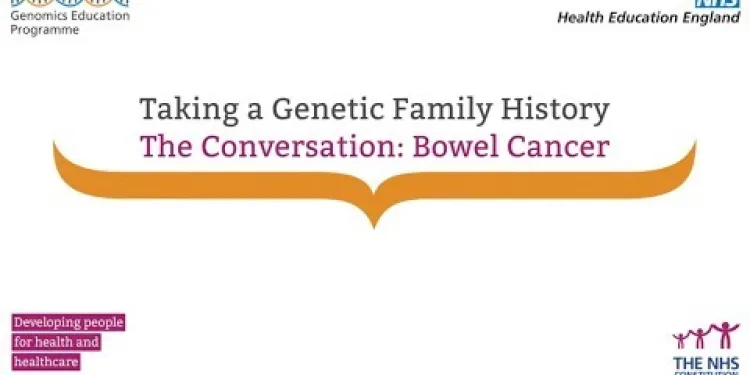
Taking a Genetic Family History - The Conversation (Bowel Cancer)
Relevance: 46%
-

What kinds of cancer screening are available?
Relevance: 46%
-

What do health organizations say about aspirin and cancer prevention?
Relevance: 46%
-

How does family history affect the risk of bowel cancer?
Relevance: 46%
-

Is genetic screening available for cancer risk?
Relevance: 45%
-
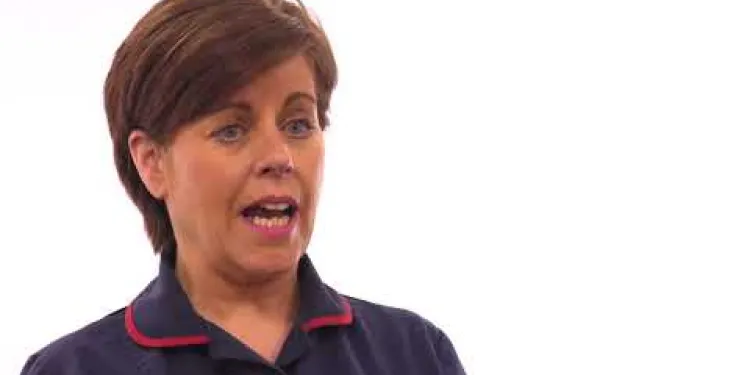
Endometrial Cancer
Relevance: 45%
What is Colorectal Cancer?
Colorectal cancer is a type of cancer that starts in the colon or the rectum, parts of the large intestine in the digestive system. Being one of the most common types of cancer in the UK, it requires significant public awareness and understanding. This cancer can also be referred to as bowel cancer, colon cancer, or rectal cancer, depending on where it originates.
Causes and Risk Factors
The exact causes of colorectal cancer are not fully understood, but certain risk factors have been identified. Age is a significant factor, with the risk increasing as people age. Most cases occur in people over 50, although younger individuals can be affected. Other risk factors include having a family history of colorectal cancer, a personal history of polyps or inflammatory bowel disease, a diet high in red or processed meats, physical inactivity, obesity, smoking, and excessive alcohol consumption. Genetic factors and inherited syndromes like familial adenomatous polyposis (FAP) and Lynch syndrome also contribute to higher risk.
Symptoms
In its early stages, colorectal cancer may not present any symptoms, which is why screening is crucial. However, as the disease progresses, symptoms may include a change in bowel habits (such as diarrhoea or constipation), blood in the stool or rectal bleeding, abdominal discomfort or pain, unexplained weight loss, and fatigue. If you experience any of these symptoms, it is essential to consult with a healthcare professional for an evaluation.
Screening and Diagnosis
Screening is a vital tool in the early detection and prevention of colorectal cancer. In the UK, bowel cancer screening is offered to people aged 60-74 every two years. Testing typically involves a home testing kit that checks for hidden blood in the stool, which might indicate cancer. If abnormalities are found, further tests, such as a colonoscopy, may be recommended to confirm the presence of cancer or polyps. Early detection through screening significantly increases the chances of successful treatment.
Treatment Options
Treatment for colorectal cancer depends on the stage and location of the cancer, as well as the patient’s overall health. Options may include surgery to remove the cancer, chemotherapy, radiation therapy, targeted therapies, and immunotherapy. The treatment plan is typically decided by a multidisciplinary team of healthcare professionals. Early-stage cancers may only require surgery, while more advanced stages might need a combination of treatments.
Prevention
While not all cases of colorectal cancer can be prevented, certain lifestyle changes can reduce the risk. Eating a balanced diet rich in fruits, vegetables, and fiber, maintaining a healthy weight, engaging in regular physical activity, limiting alcohol intake, and avoiding smoking are all effective preventative measures. Regular screening and awareness of personal and family medical history are also crucial components in prevention strategies.
What is Colorectal Cancer?
Colorectal cancer is a kind of cancer that starts in the colon or rectum. These are parts of the large intestine in your tummy. It is one of the most common cancers in the UK. This cancer is also called bowel cancer, colon cancer, or rectal cancer.
Causes and Risk Factors
Doctors do not know all the reasons why people get colorectal cancer. But some things can make it more likely. Getting older is one big reason, especially for people over 50. Other reasons include having family members who had it, eating lots of red or processed meats, not being active, being overweight, smoking, and drinking a lot of alcohol. Some illnesses that you can inherit from your family can also make it more likely.
Symptoms
At first, colorectal cancer might not cause any symptoms. That is why checking for cancer is important. As time goes on, people might notice changes in their bowel movements, blood in their poo, stomach pain, losing weight unexpectedly, or feeling very tired. If you have these signs, see a doctor.
Screening and Diagnosis
Checking for colorectal cancer early can help stop it from growing. In the UK, people aged 60-74 get a chance to do a screening test every two years. This test looks for hidden blood in the poo. If the test finds something unusual, more tests might be needed. Finding cancer early makes it easier to treat.
Treatment Options
Treatment for colorectal cancer depends on how much it has spread and where it is. It might include surgery, medicines like chemotherapy, radiation, or special medicine that targets the cancer. A team of doctors will help decide the best plan. If the cancer is caught early, sometimes surgery is enough.
Prevention
You cannot completely stop colorectal cancer, but you can do things to lower the risk. Eating healthy foods like fruits, vegetables, and whole grains, staying at a healthy weight, exercising, drinking less alcohol, and not smoking can all help. Getting regular check-ups and knowing your family’s health history are also important.
Frequently Asked Questions
What is colorectal cancer?
Colorectal cancer is a type of cancer that begins in the colon or the rectum, which are parts of the large intestine.
What are the risk factors for colorectal cancer?
Risk factors include age, family history, genetic conditions, diet, smoking, heavy alcohol use, obesity, and lack of physical activity.
What are common symptoms of colorectal cancer?
Symptoms can include changes in bowel habits, blood in stool, abdominal pain, unexplained weight loss, and fatigue.
How is colorectal cancer diagnosed?
It is diagnosed through screening tests such as colonoscopy, imaging tests, and biopsy of suspicious areas.
What are the stages of colorectal cancer?
Colorectal cancer is staged from 0 to IV, indicating the extent of the cancer's spread, with Stage 0 being very early and Stage IV being advanced.
Is colorectal cancer treatable?
Yes, colorectal cancer is treatable, especially if caught early. Treatment options include surgery, chemotherapy, radiation, and targeted therapies.
Who should get screened for colorectal cancer?
Screening is recommended for adults starting at age 45, or earlier for those with risk factors such as family history or genetic conditions.
What dietary factors affect colorectal cancer risk?
Diets high in red or processed meats and low in fruits, vegetables, and whole grains may increase risk, while a healthy diet can reduce risk.
Can lifestyle changes reduce the risk of colorectal cancer?
Yes, maintaining a healthy weight, being physically active, eating a balanced diet, limiting alcohol, and not smoking can reduce the risk.
Are there genetic tests for colorectal cancer risk?
Yes, genetic tests can identify mutations such as Lynch syndrome or familial adenomatous polyposis that increase colorectal cancer risk.
What is a colonoscopy?
A colonoscopy is a procedure where a doctor uses a long, flexible tube with a camera to examine the inside of the colon and rectum.
What is the survival rate for colorectal cancer?
Survival rates vary by stage at diagnosis, with earlier stages having higher survival rates. Overall, the 5-year survival rate is around 64%.
What is the difference between colon cancer and rectal cancer?
Colon cancer starts in the colon, while rectal cancer starts in the rectum. They are often grouped together because they have many similarities.
How can polyps in the colon lead to cancer?
Some types of polyps, like adenomatous polyps, can undergo changes over time to become cancerous if not removed.
What is the role of chemotherapy in treating colorectal cancer?
Chemotherapy uses drugs to kill cancer cells and may be used before surgery to shrink tumors or after to kill remaining cancer cells.
How does radiation therapy work for rectal cancer?
Radiation therapy uses high-energy rays to target and kill cancer cells, often used in combination with chemotherapy for rectal cancer.
What are targeted therapies for colorectal cancer?
Targeted therapies are drugs designed to target specific aspects of cancer cells to stop their growth, often with fewer side effects than traditional chemotherapy.
How does family history influence colorectal cancer risk?
Having a family history of colorectal cancer or certain genetic syndromes can increase an individual's risk of developing the disease.
What is a CEA test in colorectal cancer?
The carcinoembryonic antigen (CEA) test measures a protein that may be higher in the blood of people with colorectal cancer, used to monitor treatment response.
What support resources are available for colorectal cancer patients?
Support resources include counseling, support groups, patient advocacy organizations, and specialized care teams to help patients and families manage the disease.
What is bowel cancer?
Bowel cancer is when bad cells grow in the bowel. The bowel is a part of your body that helps digest food.
Helpful Tips:
- If you have questions, talk to a doctor.
- Look at pictures of the body to see where the bowel is.
Colorectal cancer is a kind of cancer. It starts in the colon or rectum. These are parts of the big intestine in your body.
What makes you more likely to get bowel cancer?
Things that can make someone more likely to get sick include being older, having family members who have been sick, special health conditions from parents, what you eat, smoking, drinking a lot of alcohol, being very overweight, and not moving around enough.
What are the common signs of bowel cancer?
Bowel cancer is a sickness in the big tube inside your tummy. Here are some signs to look out for:
- Pooing more often or having runny poo
- Blood in your poo
- Tummy pain that doesn’t go away
- Feeling really tired all the time
- Weight loss you can’t explain
If you notice any of these signs, tell an adult you trust or a doctor. They can help you feel better.
Some tools can help you understand better:
- Ask someone to read with you.
- Use a highlighter to mark important parts.
- Look for pictures or videos about bowel cancer.
Some signs to look out for are:
- Going to the toilet more or less often than usual.
- Finding blood in your poo.
- Having a tummy ache.
- Losing weight without trying.
- Feeling very tired.
How do doctors find out if someone has bowel cancer?
Doctors find this problem by using special tests. These tests include:
- Looking inside your body with a camera, called a colonoscopy.
- Taking pictures of the inside of your body, called imaging tests.
- Taking a small piece from any strange looking area, called a biopsy.
If it is hard to understand this, you can ask a doctor or a nurse to explain it to you. There are also special apps and websites that can help you understand medical words.
What are the steps of bowel cancer?
Bowel cancer grows in steps. It starts small and can grow bigger.
Here are the steps of bowel cancer:
- First Step: Cancer is small and only in the bowel lining.
- Second Step: Cancer grows deeper into the bowel wall.
- Third Step: Cancer spreads to nearby tissues or lymph nodes.
- Fourth Step: Cancer spreads to other parts of the body.
If you need help, you can:
- Ask a doctor or nurse to explain.
- Use picture charts to see what happens.
- Use an audiobook to listen instead of reading.
Colorectal cancer has stages from 0 to 4. Stage 0 means the cancer is just starting. Stage 4 means the cancer has spread far.
Can cancer in the bowel be treated?
Yes, bowel cancer can be treated.
If you think you might have it, see a doctor.
Doctors can help find the best treatment for you.
Ask questions if you don't understand.
Use pictures and videos to learn more.
Yes, doctors can treat bowel cancer, especially if they find it early. They can use surgery, medicine, special X-rays, and other treatments to help people get better.
Who should have a test for bowel cancer?
It is good for adults to start health checks when they turn 45. Some people might need to start earlier if they have family members who had problems or if they have certain health conditions.
What foods can change the risk of bowel cancer?
Some foods can make it more likely to get bowel cancer, and some can help keep you healthy. Eating lots of red and processed meat can increase the risk. Red meat comes from animals like cows and pigs. Processed meats are things like sausages and bacon.
Eating more fruits, vegetables, and whole grains is good for you. These foods have important things inside them that help protect your body.
Drinking too much alcohol can also increase the risk. Try to drink less alcohol or none at all.
It's important to have a balanced diet. This means eating different types of healthy foods.
Here are some tools that might help:
- Meal planning apps can help you choose healthy meals.
- Food diaries or journals can help you keep track of what you eat and drink.
- Talking to a doctor or dietitian can give you more information and help.
Eating a lot of red or processed meat can be bad for you. Not eating enough fruits, vegetables, and whole grains can also be bad. But eating healthy foods can help keep you safe.
Can changing how you live help stop bowel cancer?
Some changes in the way you live can help keep you healthy and might lower the chance of getting bowel cancer. Here are a few things you can do:
- Eat Healthy: Try to eat more fruits and vegetables.
- Exercise: Move your body and be active. It can be fun, like playing games or dancing.
- No Smoking: Smoking is bad for your health. It is good to stay away from it.
- Limit Alcohol: Too much alcohol is not good for you. It is better to drink less.
Sometimes, using simple tools like pictures or apps can help you remember these tips. You can also talk to a friendly adult for support and advice.
Yes, staying at a healthy weight, moving your body, eating good food, drinking little alcohol, and not smoking can help you stay healthy.
Can a test show if I might get bowel cancer because of my genes?
Yes, doctors can use special tests to look at your genes. These tests can find changes, called mutations, like Lynch syndrome or familial adenomatous polyposis. These changes can make it more likely for you to get colon cancer.
What is a colonoscopy?
A colonoscopy is a test. It helps doctors look inside your bottom. They use a small camera on a long, thin tube.
This test helps check for problems in your tummy. It helps see if everything is healthy inside.
Before the test, you might need to drink a special drink. This helps clear your tummy so the doctor can see better.
If you have questions about the test, ask your doctor or nurse. They are there to help you.
Some people find it helpful to listen to calming music or practice deep breathing before the test. This can help you stay relaxed.
A colonoscopy is a test that helps the doctor look inside your tummy. The doctor uses a long, bendy tube with a camera on it to see the colon and rectum.
How many people get better from bowel cancer?
How many people live for 5 years can change depending on when they find out they are sick. People who find out early have a better chance of living longer. About 64 out of 100 people live for 5 years after finding out they are sick.
If it's hard to understand, try reading with someone or use a reading app that can help you. Drawing pictures of the information can also make it easier.
How is colon cancer different from rectal cancer?
Colon cancer and rectal cancer both start in the large intestine, but they are not the same.
Colon Cancer: This type of cancer grows in the colon, which is the first part of the large intestine. The colon is like a long tube that takes in water and nutrients from your food.
Rectal Cancer: This cancer grows in the rectum, which is the last part of the large intestine. The rectum is a short tube that connects the colon to the anus.
Remember to talk to a doctor if you have questions. Look at pictures or diagrams to help understand where the colon and rectum are in your body. Using clear and simple images can help explain these differences better.
Colon cancer starts in the colon. Rectal cancer starts in the rectum. They are often talked about together because they are a lot alike.
How can lumps in the colon turn into cancer?
Sometimes, small lumps called polyps grow in the colon. The colon is part of our body where food goes after we eat. Polyps are not cancer, but they can turn into cancer over time if they are not treated. It's good to get checked by a doctor if you have polyps. The doctor can help keep you healthy.
Using pictures and videos can help you understand better. You can also ask someone you trust to explain this to you.
Some kinds of lumps in the body, called adenomatous polyps, can turn into cancer if they are not taken out.
How does chemotherapy help treat bowel cancer?
Chemotherapy is a type of medicine.
It helps kill cancer cells.
Doctors use it to treat bowel cancer, which is also called colorectal cancer.
Chemotherapy can be used in different ways:
- Before surgery: It can make the cancer smaller so it is easier to remove.
- After surgery: It helps stop the cancer from coming back.
- With other treatments: It can work together with other cancer treatments.
Doctors decide the best way to use chemotherapy for each person.
It is important to talk to your doctor to understand how chemotherapy can help you.
Using visual aids and speaking with a nurse or support person can also help you understand better.
Chemotherapy is medicine that helps to kill cancer cells. Sometimes it is used before an operation to make the tumors smaller. Other times it is used after an operation to get rid of any cancer cells that are still there.
How does radiation therapy work for rectal cancer?
What is radiation therapy?
Radiation therapy is a way to treat cancer. It uses strong rays to kill cancer cells.
How does it help?
The strong rays help to make the cancer cells smaller and stop them from growing.
How is it given?
A special machine gives the strong rays to the body. It does not hurt.
Will I feel better?
Radiation therapy can help you feel better by making the cancer smaller.
Need more help understanding?
You can ask your doctor to explain or use pictures and videos to learn more.
Radiation therapy uses strong energy beams to find and destroy cancer cells. It often works together with a medicine treatment called chemotherapy to fight rectal cancer.
What are special medicines for bowel cancer?
Some people have bowel cancer. Special medicines can help fight this cancer. These are called "targeted therapies." These medicines find and attack cancer cells.
If you want help to read, you can use a text-to-speech app. It can read the words out loud.
Targeted therapies are special medicines. They work on certain parts of cancer cells to stop them from growing. They often have fewer side effects than regular chemotherapy.
Does having family with cancer affect your chance of getting colorectal cancer?
If someone in your family had colorectal cancer, you might have a higher chance of getting it too.
You can ask your doctor to check you earlier to stay healthy.
If someone in your family had colorectal cancer, or you have certain genetic problems, you might have a higher chance of getting this disease.
What is a CEA test in bowel cancer?
The CEA test is a medical test.
Doctors use it to check for a protein called CEA.
This protein can be higher if a person has bowel cancer.
Doctors look at CEA levels to help find and treat cancer.
Tip: If you're studying about this, you can use pictures and diagrams to help you understand better. You can also ask someone to explain it to you.
The CEA test checks levels of a protein in the blood. This protein might be higher if someone has bowel cancer. Doctors use it to see how treatment is working.
What help is there for people with bowel cancer?
Bowel cancer is another name for colorectal cancer. There are many ways to get help if you have this illness.
Here are some things that can help you:
- Doctors and Nurses: They can answer your questions and take care of you.
- Support Groups: These are people you can talk to who understand what you are going through.
- Hotlines: You can call for advice and support.
- Online Information: Websites have helpful tips and stories from others.
- Books and Leaflets: These give you more information about bowel cancer.
- Family and Friends: They can give you love and support.
Talking to someone about how you feel is important. You can also write down things you want to ask your doctor. This can help you remember what to talk about next time you visit.
Here are some ways to get help:
- Talking to a counselor.
- Joining support groups.
- Getting help from patient advocacy groups.
- Working with special care teams.
These can help you and your family deal with the illness.
Useful Links
This website offers general information and is not a substitute for professional advice.
Always seek guidance from qualified professionals.
If you have any medical concerns or need urgent help, contact a healthcare professional or emergency services immediately.
- Ergsy carfully checks the information in the videos we provide here.
- Videos shown by Youtube after a video has completed, have NOT been reviewed by ERGSY.
- To view, click the arrow in centre of video.
- Most of the videos you find here will have subtitles and/or closed captions available.
- You may need to turn these on, and choose your preferred language.
- Go to the video you'd like to watch.
- If closed captions (CC) are available, settings will be visible on the bottom right of the video player.
- To turn on Captions, click settings .
- To turn off Captions, click settings again.
More Items From Ergsy search
-

What is colorectal cancer?
Relevance: 100%
-

Is genetic testing available for colorectal cancer?
Relevance: 92%
-

Can aspirin stop colorectal cancer?
Relevance: 92%
-

What factors increase my risk of colorectal cancer?
Relevance: 91%
-

What are the recommendations for colorectal cancer screening?
Relevance: 90%
-

Is aspirin recommended for everyone to prevent colorectal cancer?
Relevance: 89%
-

Are there risks associated with home colorectal cancer tests?
Relevance: 88%
-

How can I test myself for colorectal cancer?
Relevance: 88%
-

Will insurance cover the cost of home colorectal cancer tests?
Relevance: 87%
-

Has aspirin been proven to cure colorectal cancer?
Relevance: 87%
-

Can home colorectal cancer tests replace a colonoscopy?
Relevance: 86%
-

What are the advantages of an at-home colorectal cancer test?
Relevance: 86%
-
Can lifestyle changes also help prevent colorectal cancer?
Relevance: 85%
-

How often should I perform a home colorectal cancer test?
Relevance: 84%
-

Should people with a family history of colorectal cancer take aspirin?
Relevance: 84%
-
Is aspirin more effective for certain age groups in preventing colorectal cancer?
Relevance: 80%
-

Can aspirin prevent colorectal cancer?
Relevance: 66%
-

Are home tests for colorectal cancer accurate?
Relevance: 66%
-
Are there ongoing studies about aspirin and colorectal cancer?
Relevance: 63%
-

What alternative methods exist to screen for colorectal cancer?
Relevance: 59%
-

Can lifestyle factors influence the results of a colorectal cancer test?
Relevance: 59%
-
Is aspirin effective in preventing other types of cancer?
Relevance: 58%
-

What are the main methods for testing yourself for colorectal cancer?
Relevance: 58%
-

At what age should I start testing myself for colorectal cancer?
Relevance: 56%
-

What is the difference between colon cancer and rectal cancer?
Relevance: 54%
-

How long does it take to get results from a home colorectal cancer test?
Relevance: 53%
-

How does aspirin work to reduce cancer risk?
Relevance: 51%
-
How long do studies suggest taking aspirin for cancer prevention?
Relevance: 49%
-

What is Bowel Cancer?
Relevance: 49%
-

What dosage of aspirin is considered effective for cancer prevention?
Relevance: 47%
-

How common is bowel cancer?
Relevance: 47%
-

What should I do if I'm considering aspirin for cancer prevention?
Relevance: 47%
-
Has the FDA approved aspirin for cancer prevention?
Relevance: 47%
-

What are the risk factors for bowel cancer?
Relevance: 46%
-

Taking a Genetic Family History - The Conversation (Bowel Cancer)
Relevance: 46%
-

What kinds of cancer screening are available?
Relevance: 46%
-

What do health organizations say about aspirin and cancer prevention?
Relevance: 46%
-

How does family history affect the risk of bowel cancer?
Relevance: 46%
-

Is genetic screening available for cancer risk?
Relevance: 45%
-

Endometrial Cancer
Relevance: 45%


